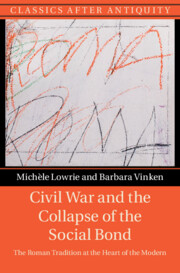Book contents
- Civil War and the Collapse of the Social Bond
- Classics after Antiquity
- Civil War and the Collapse of the Social Bond
- Copyright page
- Dedication
- Dedication
- Contents
- Figures
- Preface
- Acknowledgments
- Introduction
- Chapter 1 Figures of Discord
- Chapter 2 Oriental Empire
- Chapter 3 Empire without End
- Chapter 4 The Eternal City
- Chapter 5 The Republic to Come
- Chapter 6 The Empire to Come
- Bibliography
- Index
Chapter 2 - Oriental Empire
Vergil, Georgics
Published online by Cambridge University Press: 06 October 2022
- Civil War and the Collapse of the Social Bond
- Classics after Antiquity
- Civil War and the Collapse of the Social Bond
- Copyright page
- Dedication
- Dedication
- Contents
- Figures
- Preface
- Acknowledgments
- Introduction
- Chapter 1 Figures of Discord
- Chapter 2 Oriental Empire
- Chapter 3 Empire without End
- Chapter 4 The Eternal City
- Chapter 5 The Republic to Come
- Chapter 6 The Empire to Come
- Bibliography
- Index
Summary
The gorgeous surface of Vergil’s didactic poem on farming lulls the reader into a sense of false security – by the end of the poem, scenes of plague, crop failure, and the collapse of an allegorical society of bees brings vividness to the contemporary context of civil war. Analogy invites us to see the bees as Romans, but plausible deniability keeps the similarities from cutting too close. Although Aristaeus, the beekeeper, manages to restore his hive, the fantastical bugonia, which brings rebirth from an abject, rotting corpse of a bludgeoned calf, alienates. Out of Egypt, it offers an illusory salvation. Technology and sacrifice, in parallel registers, each fail to achieve the task at hand. Aristaeus is being punished for threatening to rape Orpheus’ wife Eurydice and causing her death. What is needed is not just to bring the dead back to life, but to placate the spirit of Eurydice, whose etymology, “broad justice,” reveals the real need as social restoration. The bees’ tendency to faction and to adore an autocratic monarch, on the model of Egypt, warns that the price of restoration for Rome after civil war is an oriental empire.
- Type
- Chapter
- Information
- Civil War and the Collapse of the Social BondThe Roman Tradition at the Heart of the Modern, pp. 47 - 81Publisher: Cambridge University PressPrint publication year: 2022

